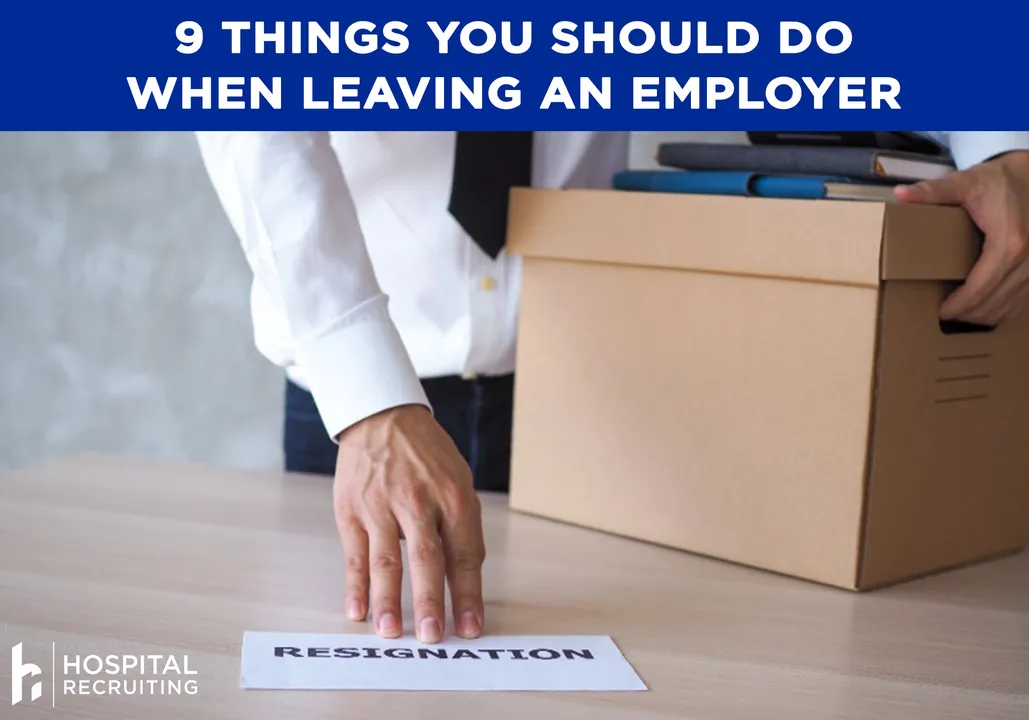Top 9 Things You Should Do When Leaving an Employer

Starting a new position can be an exciting time, however, it is still important to leave your old job the right way. Leaving correctly can help you avoid problems later and ensure that you leave things the right way with your old employer. By making sure that you have taken the right steps when leaving you have set yourself up for success in your new job.
1. Look Before You Leap
When leaving your job it is important to make sure that you have a plan. This may involve living off of savings, but generally involves getting a new job. It is important to make sure that you have an offer in place and accepted before you actually pull the trigger in leaving your current job. People are often eager to begin a new step in their careers. Acting prematurely can have terrible consequences if your next step isn’t a sure thing.
2. Review the Policies
Most jobs require two weeks’ notice in the form of a written letter stating that you are resigning from your position. Different employers have different requirements, and it is often something that you haven’t thought about extensively during your time there. Be sure to review these policies and make sure that there are no surprises when you actually go to resign.
3. Keep What is Yours
If you own files, emails, or anything else that is in the control of the company that you are leaving be sure to make sure that you copy and secure what is yours before notifying them that you are leaving. Be careful that you do not violate any privacy agreements or remove anything that actually belongs to the company.
4. Keep it To Yourself Until It’s Time
Taking the next step in your career is exciting; however, you should not discuss it with anyone whom you work with until it’s time to take action and give your notice. News spreads fast in most workplaces, and it can sour your relationship with your boss if they find out you are leaving from someone that isn’t you. Additionally, keeping it to yourself ensures that you are able to make sure your future is secure and control the timing rather than having it come out prematurely.
5. Don’t Burn the Bridge
Maybe you hate the job you are leaving. It can be tempting when leaving a bad job or a bad boss to give your notice, tell your boss what you really think, and walk out never to be seen again. However, it is almost always best to avoid a situation where you would never be allowed back. You may need that employer for references, or they may have connections you don’t know about.
Consider avoiding the temptation to tell them what you really think in bad situations and instead resign nicely, following their policies. You are much less likely to regret leaving amicably than you are to regret leaving in bad circumstances.
6. Make a Clean Break
If you are leaving, make sure that it is a clean break. Leaving people you’ve worked with for years can be difficult, and it may be tempting to keep a shift a month for old-time’s sake if that is an option. If you are genuinely moving from one job to another, however, you should fully leave your old job so that you can focus on your new opportunity.
7. Schedule an Exit Interview
Most employers will want to schedule an exit interview. This will be where you hand in your access card and equipment. It will also be the appropriate medium for you to give feedback on how things were at your old job. Be sure to balance out any negatives with positives where possible. It is a time for you to not only point out areas for improvement, but also to recognize good situations and people that helped you in your career.
8. Review Your Ending Benefits
Most jobs have benefits that may continue once you leave or may require action on your part to maintain, such as a 410(k). Be sure to review your benefits before you resign, especially if you are not going to have access to benefits, like health insurance, in your new job. During a transitional period, there are typically strict timeframes and processes that must be followed. Knowing the process ahead of time is important.
9. Take Time Off
Everyone’s situation will be different; however, you should consider trying to leave yourself a few weeks between jobs. Taking time off can be difficult, and the transition between jobs can be a great time to spend resting and rejuvenating so that you can start your new position focused and ready for success.
Related Posts
